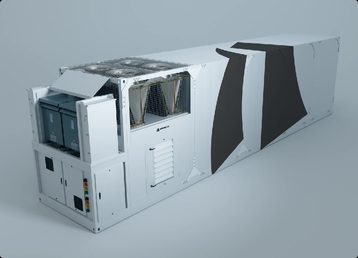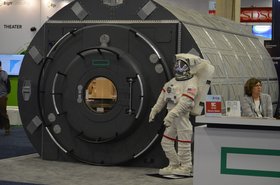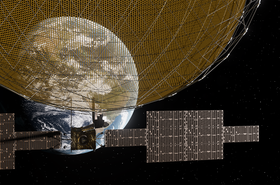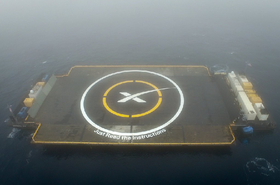Edge computing firm Armada has come out of stealth and raised $55 million for its Edge computing modules and management platform.
The Washington-based business offers ruggedized and self-contained satellite-connected data center modules (in 3-rack 20ft and 6-rack 40ft models) known as Galleons that use SpaceX’s Starlink network, and an Edge device and computing management platform. The company also offers Edge/AI applications.
The funding round was led by Founders Fund, Lux Capital, Shield Capital, and 8090 Industries, with participation from Felicis, Contrary, Valor Equity Partners, Marlinspike, 137 Ventures, Koch Real Estate Investments, 8VC, and other investors.
“Today, AI - including large language models, multimodal AI, and predictive models - is revolutionizing every facet of our lives and work, but not everyone has the same opportunity. What’s truly astounding is that vast swaths of the world still lack basic Internet access, much less the ability to derive tangible value from their data,” said Armada co-founder and CEO Dan Wright.
“Armada’s mission is to bridge the digital divide once and for all, giving our customers the ability to solve their biggest problems.”
Justin Wilson, managing director at Koch Real Estate Investments, added: “Armada plays a vital role in addressing the growing compute needs of industrial IoT for manufacturing and industrial applications, a sector that has been vastly underserved but is crucial in today’s landscape."
Armada declined to comment to SpaceNews on whether it is partnering with SpaceX, which has not commented on the venture. Armada has previously said it has “collaborated” with Elon Musk’s company without providing further details.
According to Forbes, Armada has no customers beyond a proof-of-concept trial with mining company Nexa Resources. The startup is targeting remote & off-grid applications such as defense and mining. In January, venture capital firms Founders Fund, Lux Capital, and Shield Capital led a $15 million seed round into Armada.
“There is an impossibly large volume of data created at the Edge, and regrettably, virtually nothing is done with it,” said Armada co-founder and chief operating officer Jon Runyan. “We’re exceptionally fortunate to have the best talent in the world on our team, as well as the support of our incredible syndicate of investors and advisors.”
The company said Trae Stephens of Founders Fund and Anduril, Kerem Ozmen of 8090 Industries, and Armada co-founder CTO, Pradeep Nair, have joined its Board of Directors.
CEO Dan Wright left AI company DataRobot last year in the wake of reports that top executives at the AI vendor, including then-CEO Wright, had cashed out stocks that longtime employees could not sell. Runyan was previously at Okta, while Nair previously held roles at VMware and Microsoft.
Microsoft, meanwhile, announced its own modular container-sized data center back in 2020 - with optional SpaceX Starlink connectivity.
In other recent satellite news:
- The FCC has issued a final denial around Starlink’s request for $885 million in public grants under the Rural Digital Opportunity Fund.
“The Commission determined that Starlink failed to demonstrate that it could deliver the promised service,” the FCC said. “Funding these vast proposed networks would not be the best use of limited Universal Service Fund dollars to bring broadband to unserved areas across the United States.”
- Sunrise Park Resort in Arizona is relying entirely on Starlink terminals for its connectivity.
- Air New Zealand is to trial Starlink broadband on domestic flights. Terminals will be installed on two Air New Zealand planes – including a turboprop-powered ATR aircraft – in late 2024 for an initial four-to-six-month period, before looking to expand to the rest of its 105-strong fleet in 2025.
- OneWeb has signed distribution deals with Hanwha Systems to deliver satellite connectivity in South Korea, and a “multi-million-dollar” deal with Rawafed Libya - Telecommunication & Technology (RLTT) to deliver connectivity across Libya from next year.
- Galaxy Broadband, a subsidiary of Crown Capital Partners, has been awarded a multi-year contract to provide Shared Services Canada, a department of the Government of Canada, with satellite services via OneWeb.
- Vivacom and Eutelsat had launched a ground station in Stara Zagora, Bulgaria for OneWeb. The ground station consists of 18 antennas and a ‘mini data center.’ It is OneWeb’s fourth ground station site in Europe and 35th globally.
- NTT and SKY Perfect JSAT have signed a deal to distribute Amazon’s Kuiper to Japanese commercial and government users; MNO NTT Docomo will use it for backhaul from non-terrestrial-covered regions. Beta testing is due to start from H2 2024.
- NTT, Docomo, Sky Perfect, and Space Compass have been selected by the National Institute of Information and Communications Technology (NICT) to develop direct-to-device (D2D) mobile services, which will be deployed via a space-based non-terrestrial network (NTN) using high-altitude platform stations (HAPS). Space Compass plans to launch HAPS services in 2025.
- Lynk has launched direct-to-cell services in Vanuatu in partnership with Vodafone. The services has initially launched with SMS service in areas in Santo, Ambae, Maewo, Gaua and part of Mere Lava, North Pentecost, and Malekula. The service will expand across Vanuatu over time, later adding voice and mobile broadband capabilities.
- Aalyria has announced a partnership with space traffic management firm LeoLabs and won a contract with the European Space Agency to build an O-RAN-compliant orchestration platform.
- Huawei has reportedly conducted a LEO satellite test, achieving download speeds peaking at 660Mbps.








